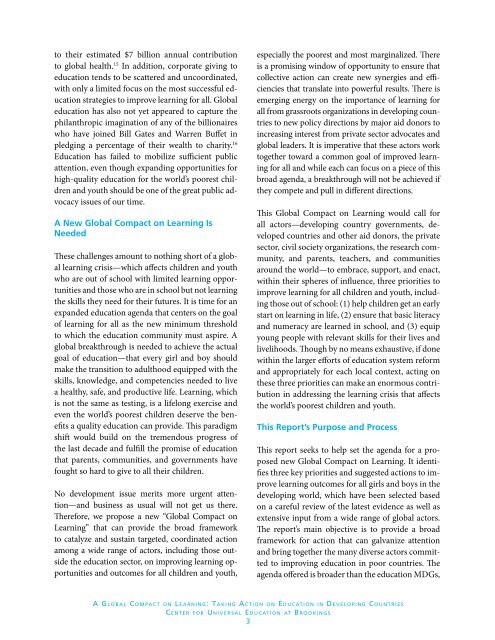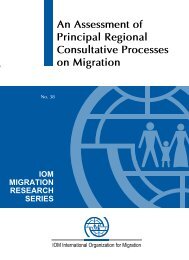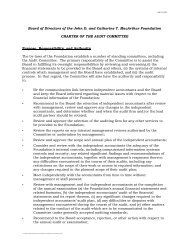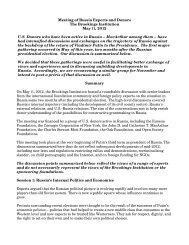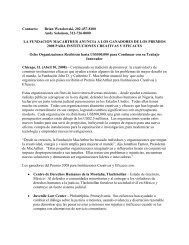A Global Compact on Learning - Brookings Institution
A Global Compact on Learning - Brookings Institution
A Global Compact on Learning - Brookings Institution
Create successful ePaper yourself
Turn your PDF publications into a flip-book with our unique Google optimized e-Paper software.
to their estimated $7 billi<strong>on</strong> annual c<strong>on</strong>tributi<strong>on</strong><br />
to global health. 15 In additi<strong>on</strong>, corporate giving to<br />
educati<strong>on</strong> tends to be scattered and uncoordinated,<br />
with <strong>on</strong>ly a limited focus <strong>on</strong> the most successful educati<strong>on</strong><br />
strategies to improve learning for all. <str<strong>on</strong>g>Global</str<strong>on</strong>g><br />
educati<strong>on</strong> has also not yet appeared to capture the<br />
philanthropic imaginati<strong>on</strong> of any of the billi<strong>on</strong>aires<br />
who have joined Bill Gates and Warren Buffet in<br />
pledging a percentage of their wealth to charity. 16<br />
Educati<strong>on</strong> has failed to mobilize sufficient public<br />
attenti<strong>on</strong>, even though expanding opportunities for<br />
high-quality educati<strong>on</strong> for the world’s poorest children<br />
and youth should be <strong>on</strong>e of the great public advocacy<br />
issues of our time.<br />
A New <str<strong>on</strong>g>Global</str<strong>on</strong>g> <str<strong>on</strong>g>Compact</str<strong>on</strong>g> <strong>on</strong> <strong>Learning</strong> Is<br />
Needed<br />
These challenges amount to nothing short of a global<br />
learning crisis—which affects children and youth<br />
who are out of school with limited learning opportunities<br />
and those who are in school but not learning<br />
the skills they need for their futures. It is time for an<br />
expanded educati<strong>on</strong> agenda that centers <strong>on</strong> the goal<br />
of learning for all as the new minimum threshold<br />
to which the educati<strong>on</strong> community must aspire. A<br />
global breakthrough is needed to achieve the actual<br />
goal of educati<strong>on</strong>—that every girl and boy should<br />
make the transiti<strong>on</strong> to adulthood equipped with the<br />
skills, knowledge, and competencies needed to live<br />
a healthy, safe, and productive life. <strong>Learning</strong>, which<br />
is not the same as testing, is a lifel<strong>on</strong>g exercise and<br />
even the world’s poorest children deserve the benefits<br />
a quality educati<strong>on</strong> can provide. This paradigm<br />
shift would build <strong>on</strong> the tremendous progress of<br />
the last decade and fulfill the promise of educati<strong>on</strong><br />
that parents, communities, and governments have<br />
fought so hard to give to all their children.<br />
No development issue merits more urgent attenti<strong>on</strong>—and<br />
business as usual will not get us there.<br />
Therefore, we propose a new “<str<strong>on</strong>g>Global</str<strong>on</strong>g> <str<strong>on</strong>g>Compact</str<strong>on</strong>g> <strong>on</strong><br />
<strong>Learning</strong>” that can provide the broad framework<br />
to catalyze and sustain targeted, coordinated acti<strong>on</strong><br />
am<strong>on</strong>g a wide range of actors, including those outside<br />
the educati<strong>on</strong> sector, <strong>on</strong> improving learning opportunities<br />
and outcomes for all children and youth,<br />
especially the poorest and most marginalized. There<br />
is a promising window of opportunity to ensure that<br />
collective acti<strong>on</strong> can create new synergies and efficiencies<br />
that translate into powerful results. There is<br />
emerging energy <strong>on</strong> the importance of learning for<br />
all from grassroots organizati<strong>on</strong>s in developing countries<br />
to new policy directi<strong>on</strong>s by major aid d<strong>on</strong>ors to<br />
increasing interest from private sector advocates and<br />
global leaders. It is imperative that these actors work<br />
together toward a comm<strong>on</strong> goal of improved learning<br />
for all and while each can focus <strong>on</strong> a piece of this<br />
broad agenda, a breakthrough will not be achieved if<br />
they compete and pull in different directi<strong>on</strong>s.<br />
This <str<strong>on</strong>g>Global</str<strong>on</strong>g> <str<strong>on</strong>g>Compact</str<strong>on</strong>g> <strong>on</strong> <strong>Learning</strong> would call for<br />
all actors—developing country governments, developed<br />
countries and other aid d<strong>on</strong>ors, the private<br />
sector, civil society organizati<strong>on</strong>s, the research community,<br />
and parents, teachers, and communities<br />
around the world—to embrace, support, and enact,<br />
within their spheres of influence, three priorities to<br />
improve learning for all children and youth, including<br />
those out of school: (1) help children get an early<br />
start <strong>on</strong> learning in life, (2) ensure that basic literacy<br />
and numeracy are learned in school, and (3) equip<br />
young people with relevant skills for their lives and<br />
livelihoods. Though by no means exhaustive, if d<strong>on</strong>e<br />
within the larger efforts of educati<strong>on</strong> system reform<br />
and appropriately for each local c<strong>on</strong>text, acting <strong>on</strong><br />
these three priorities can make an enormous c<strong>on</strong>tributi<strong>on</strong><br />
in addressing the learning crisis that affects<br />
the world’s poorest children and youth.<br />
This Report’s Purpose and Process<br />
This report seeks to help set the agenda for a proposed<br />
new <str<strong>on</strong>g>Global</str<strong>on</strong>g> <str<strong>on</strong>g>Compact</str<strong>on</strong>g> <strong>on</strong> <strong>Learning</strong>. It identifies<br />
three key priorities and suggested acti<strong>on</strong>s to improve<br />
learning outcomes for all girls and boys in the<br />
developing world, which have been selected based<br />
<strong>on</strong> a careful review of the latest evidence as well as<br />
extensive input from a wide range of global actors.<br />
The report’s main objective is to provide a broad<br />
framework for acti<strong>on</strong> that can galvanize attenti<strong>on</strong><br />
and bring together the many diverse actors committed<br />
to improving educati<strong>on</strong> in poor countries. The<br />
agenda offered is broader than the educati<strong>on</strong> MDGs,<br />
A <str<strong>on</strong>g>Global</str<strong>on</strong>g> Compa c t <strong>on</strong> <strong>Learning</strong>: Taking Acti<strong>on</strong> <strong>on</strong> Educat i o n in Developing Countries<br />
C e n t e r for Universal Educat i o n at <strong>Brookings</strong><br />
3


